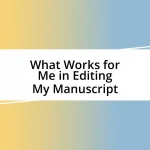Key takeaways:
- Daily writing enhances creativity, clarity of thoughts, and instills discipline, transforming writing into a routine that fosters personal growth.
- Overcoming writer’s block involves techniques like freewriting, mind mapping, and setting small goals to stimulate ideas and maintain progress.
- Reflecting on one’s writing journey reveals personal evolution, boosts confidence, and highlights the connection between emotions and creativity.
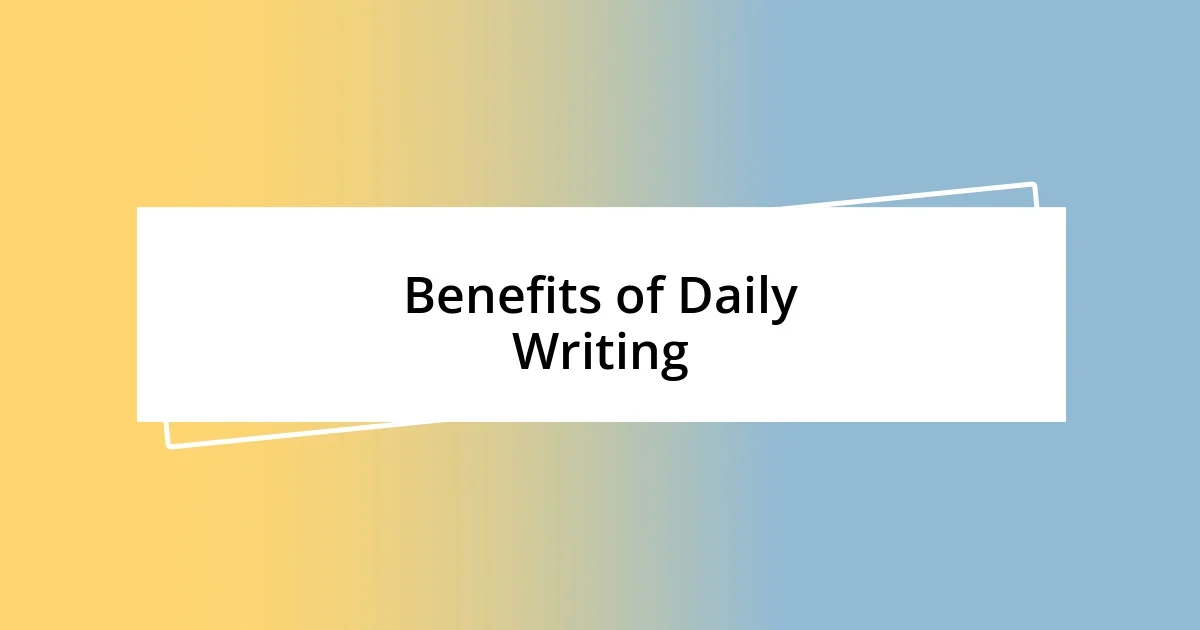
Benefits of Daily Writing
One of the most significant benefits of daily writing is the boost it gives to your creativity. I remember sitting down one morning, half-asleep and uninspired, when suddenly, the act of writing sparked a flood of imaginative ideas I never thought I had. Have you ever noticed how creativity flows when you simply start putting pen to paper? It’s like opening a tap – the more you write, the more ideas you’ll discover.
Another advantage of writing daily is the clarity it brings to your thoughts. When I took to journaling, I found myself untangling complex emotions and thoughts that had been swirling in my mind. It’s truly astonishing how articulating your feelings can create a sense of order. Have you ever sat down to write about something bothering you, only to walk away feeling lighter and more at peace?
Lastly, the discipline of daily writing instills a sense of routine and purpose. There were weeks when I didn’t feel like writing at all, yet forcing myself to sit down each day turned into something powerful. I realized that consistency built not just my writing skills, but also a sense of accomplishment. Isn’t it fulfilling to see your commitment transform into progress, bit by bit?
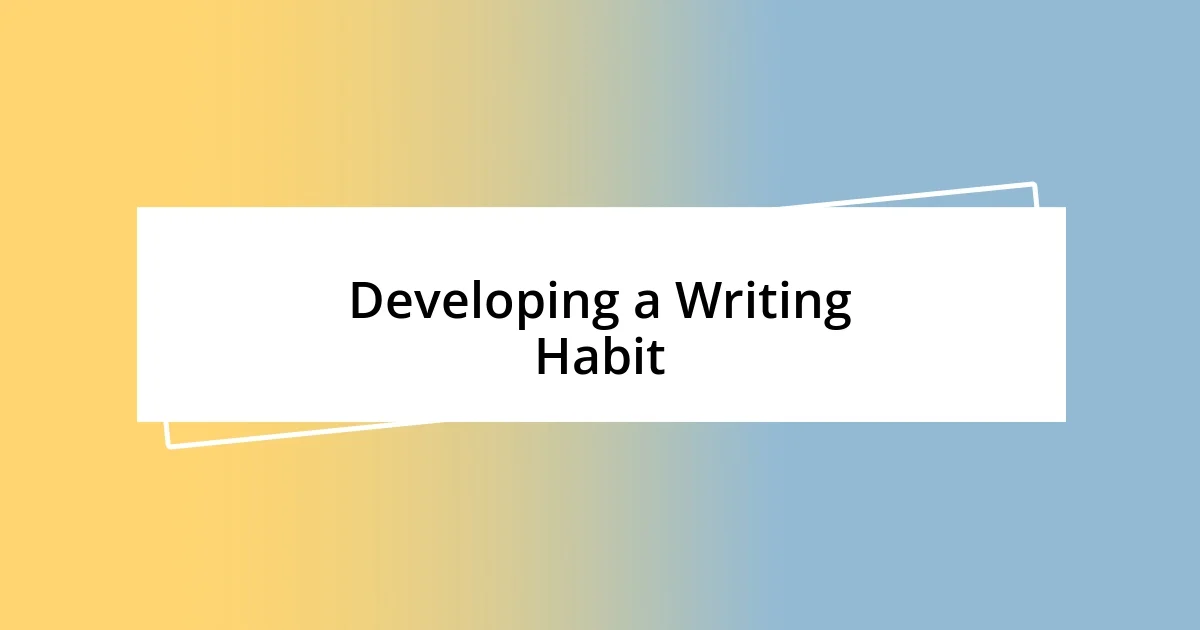
Developing a Writing Habit
Developing a writing habit is like training a muscle; it requires consistency, patience, and a bit of discipline. I distinctly remember the early days of my writing journey when sitting down felt more like a chore than a choice. However, as I carved out the time each day, it transformed into a sanctuary for my thoughts. Have you ever felt that shift from reluctance to yearning when engaging in a task? It’s remarkable to witness how something that initially seemed daunting became an essential part of my daily routine.
Establishing a dedicated time for writing significantly influenced my commitment. I began by scheduling short sessions in the morning, when my mind was still fresh. The mornings soon felt sacred; the world outside was quiet, and my thoughts flowed freely. I’ve come to cherish that time, like a morning coffee that wakes up my creativity. What about you? Do you have a time of day when inspiration strikes? Finding that golden hour made all the difference for me.
I also discovered that creating a comfortable writing environment was crucial. I set up a cozy corner in my room with my favorite mug and a soft blanket. An environment that feels inviting can often lead to greater focus and motivation. I recall a day when my cozy setup resulted in an unexpected burst of creativity that flowed seamlessly onto the page. Do you think your surroundings affect your writing? Mine certainly do, and I’m eager to hear about yours.
| Habit Development Strategy | Description |
|---|---|
| Consistency | Writing daily, at the same time, helps build a habit. |
| Creating a Ritual | Establish a comforting and inspiring workspace. |

Overcoming Writer’s Block Techniques
Sometimes, when I sit in front of a blank page, it feels like the weight of the world is pressing down, nearly suffocating my thoughts. I’ve found that taking a break helps; stepping outside for a breather or just shifting my focus can make all the difference. Walking around my neighborhood often clears my head, allowing new ideas to emerge. Have you ever noticed how changing your environment gives you fresh perspectives?
Here are some techniques I’ve found useful to combat those stubborn blocks:
- Freewriting: Set a timer for ten minutes and write without stopping, editing, or thinking too much. Let your thoughts flow, no matter how jumbled they are.
- Mind Mapping: Create a visual representation of your ideas. This method has often helped me connect thoughts that seemed unrelated.
- Set Small Goals: Instead of aiming for a complete chapter, tackle a single paragraph or even a sentence. I recall a day I broke it down so small, I felt a rush of accomplishment just by finishing one thought.
- Change Your Medium: If typing isn’t working, try writing by hand or dictating your ideas. I sometimes find that the physical act of writing produces a different rhythm.
- Read for Inspiration: Dive into a book or article that inspires you. I can’t tell you how many times a few pages turned my block into motivation.
It’s all about finding what works best for you and being flexible with your approach. Each writer has their unique path, and sometimes the key lies in a fresh technique or perspective.

Finding Your Unique Voice
Finding your unique voice in writing is a journey that often feels both exhilarating and daunting. I still remember the day I stumbled upon my authentic expression; it was like discovering a hidden treasure. Through countless drafts, I noticed that my writing flourished when I wrote as I spoke—raw, honest, and peppered with my quirks. Can you recall a moment when your words felt like they truly represented you?
I found that embracing vulnerability plays a significant role in developing that voice. In my early writing days, I hesitated to share personal stories, fearing judgment. One afternoon, I decided to share a memory that was particularly close to my heart. The response was overwhelmingly positive, and it dawned on me that the moments I held most dearly resonated with others too. Isn’t it liberating to realize that your experiences, no matter how small, have the power to connect with someone else?
Additionally, experimenting with different styles and genres became a revelation. I dabbled in poetry one week and short fiction the next, and each shift unveiled new facets of my voice. It’s as if I were peeling away layers of an onion, revealing depth and richness beneath. Have you ever tried writing in a different style just to see how it feels? That playful exploration can unlock doors you didn’t even know existed.
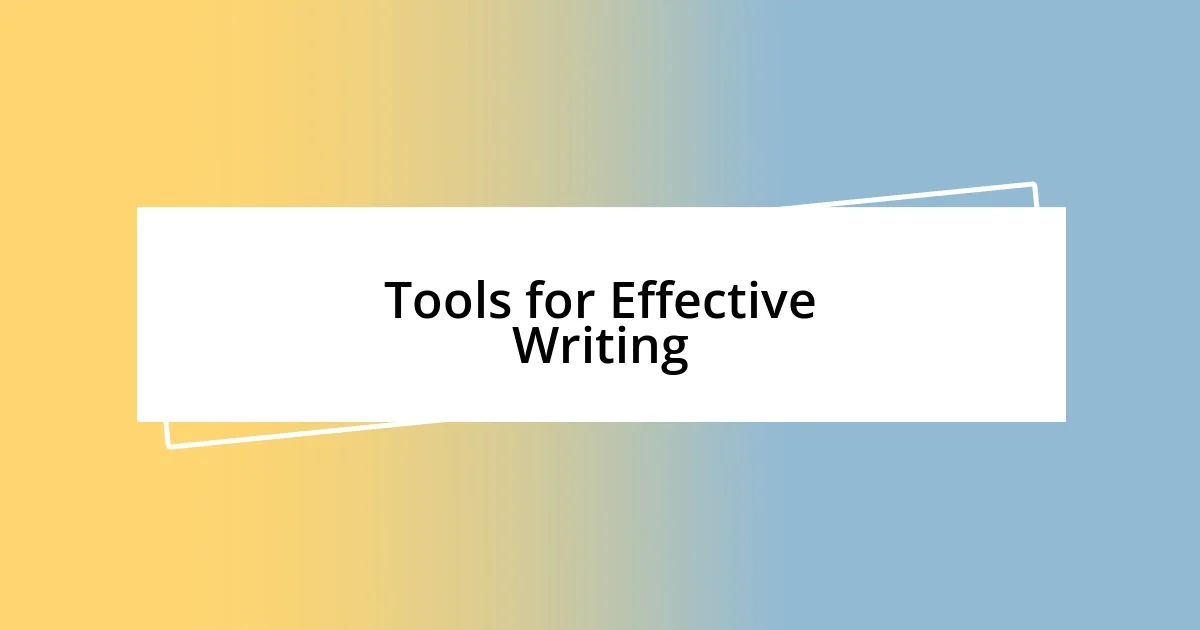
Tools for Effective Writing
When it comes to the tools for effective writing, I’ve discovered that using a reliable writing app can truly streamline the process. Personally, I lean toward platforms like Scrivener—it helps me organize my thoughts and keeps all my research in one place. But I always remind myself that the tool is only as good as the writer using it; do you have a favorite app that enhances your writing experience?
Another tool I find invaluable is grammar-checking software. I remember the days when I’d comb through my drafts for errors, often missing things on the first few passes. Now, using tools like Grammarly, I can focus on the content itself while the software takes care of correcting awkward phrasing and punctuation. It’s like having a trusty friend by my side, making suggestions. Have you ever felt that editing can sometimes drain your creative energy?
Lastly, I can’t underestimate the power of distraction-free writing environments. I’ve experimented with everything from classic typing interfaces to minimalist apps that strip away distractions. I once had a particularly productive session using a simple text editor where the only option was to write. It felt liberating! What do you think—could a change in your writing environment help spark your creativity?

Setting Achievable Writing Goals
Setting achievable writing goals has been pivotal in my own writing journey. I started with just ten minutes a day, and that small commitment helped me build momentum without feeling overwhelmed. Have you ever noticed how setting a tiny goal can create a ripple effect of productivity?
One memorable moment was when I decided to aim for a specific word count each week. At first, hitting those numbers felt intimidating, yet I quickly learned to break it down. Instead of thinking about a daunting 2,000 words, I’d focus on just 300 words a day. It was surprising how those small victories piled up. Have you ever broken a big task into bite-sized pieces? Sometimes, it’s the smallest shift that leads to the greatest progress.
Celebrating achievements, no matter how minor, has been another key element for me. I remember completing my first month of daily writing—it felt like I had conquered a mountain! I treated myself to a favorite treat, and that small reward reinforced my commitment. Isn’t it amazing how acknowledging your own efforts can create a positive feedback loop? Setting achievable goals is not merely about productivity; it’s about creating a rewarding experience that keeps you engaged and motivated.
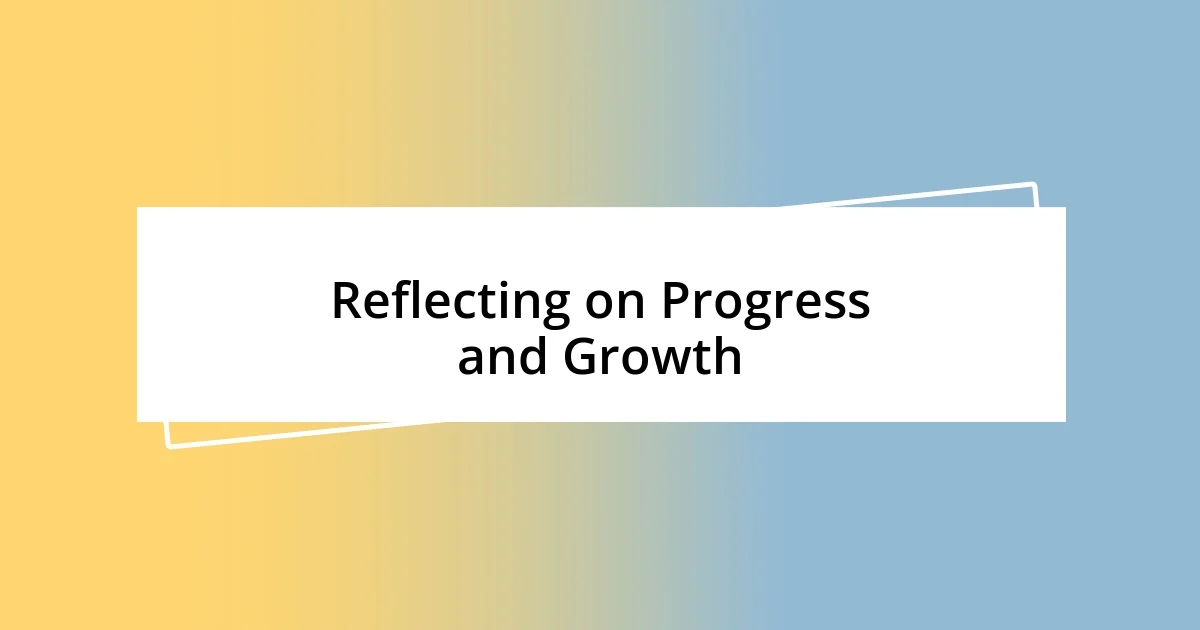
Reflecting on Progress and Growth
Reflecting on my progress and growth through daily writing has been enlightening. I distinctly remember the first time I revisited an old piece—I couldn’t help but cringe at the awkward phrases I once thought were brilliant. It made me realize how far I’ve come in terms of clarity and expressing my voice. Does it ever amaze you how much you evolve as a writer?
One of my most significant revelations has come from tracking my emotional journey alongside my writing. I discovered that some days, the words flowed effortlessly, while others required every ounce of willpower. It struck me how these fluctuations mirrored my personal life—better days resulted in more vibrant writing, which was both inspiring and frustrating. Have you found that your mood influences your creativity too?
As I continued this daily ritual, I noticed my confidence blossoming. Initially, I hesitated to share my work, fearing judgment. But over time, as I began to receive positive feedback from peers, I learned to embrace vulnerability. I cherish those moments now, realizing that growth occurs outside my comfort zone. How often do we limit ourselves simply because of fear?













